817 Search Results for praactical teaching
September 12, 2013
by Robin Parker -
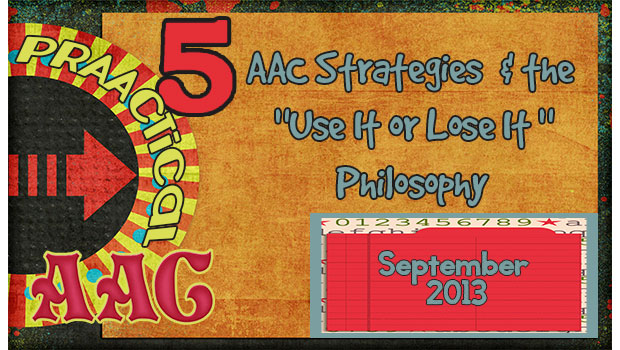
School has begun for almost everyone. Some classes have been in session for a while and routines have been formed, learning is taking place, behaviors have settled down. Now comes what can seem like the hard part: Keeping up with and expanding the strategies that helped students become successful. Instead of trying to fade AAC displays/devices and visual supports, stick with the basics and expand how they can be used. Because if you don’t use it, you may lose it. So: Keep up with: Visual Schedules– monthly, daily, and mini. Even if students know the schedule, continue to use it. Most of us would not like ‘losing’ our day planner or ‘to do’ lists even though we know our schedules. Aided Language Input First- Then Visual Support Visual Boundaries Access to a AAC Display/Device– And the display or device is with the student All the time, everywhere, charged, working, and... [Read More...]
September 11, 2013
by Robin Parker -
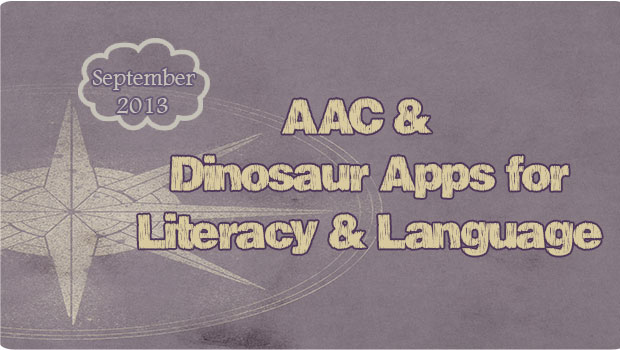
We have students of all ages who love dinosaurs. From young children to the teenager or adult we can use the theme of dinosaurs when teaching AAC, language and literacy. You can do a theme of fun dinosaurs all the way to paleontology and archeology. Dinosaurs as a theme can support goals for core & fringe vocabulary, narratives, reading, and writing. Many students will do more and work harder if there is a high interest theme. Here are some apps for those dinosaur loving students. Dinosaurs Books BooksHow to Hide A Dinosaur– children, iPad, fun book Dinoboy Adventures– children, iPad & iPhone +, interactive book where you can make choices to modify the story Tiny Time Machine- Dinosaurs– children, iPad & iPhone +, a travel adventure mystery Oh Can You Say Di -NO -Saur Dr. Seuss Cat In the Hat– children, iPad & iphone + , fun book Dinosaur Book HD: iDinobook–... [Read More...]
September 7, 2013
by Carole Zangari -
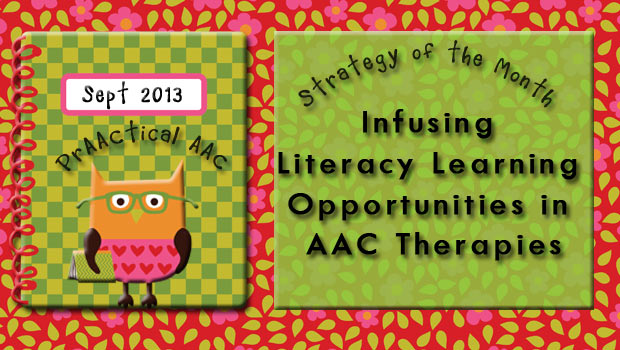
Most of our conversations with SLPs about teaching literacy to individuals with AAC needs revolve around the ‘How’s.” “How can I possibly teach reading and writing? I don’t have enough time with her to teach language and communication!” “How am I going to teach reading to someone who can’t sound out words? Or writing to someone who can barely use a pencil or keyboard?” In general, SLPs WANT to teach literacy skills. They understand the importance of this skill set and how it can level the playing field for people with communication difficulties. They know that reading and writing are inherently linked to speaking and listening. They know that literacy is a powerful key that unlocks many, many doors. And yet, getting from there to the point of actually teaching clients with AAC needs to read and write is not something we do enough of. This month, we’ll look at ways... [Read More...]
September 4, 2013
by Robin Parker -

Strategy of the Month Back to School with AAC AAC ‘Must Haves’ for the Classroom & Speech Room PrAACtical Partnerships: AAC & Academics AAC Around the School and Beyond Core Words & the Curriculum PrAACtical Thinking 5 Things to Remember About AAC Technology Fun Friday Commenting to the Max 31 Posts You May Have Missed in July Keep Calm & …………. Great Music Apps & AAC Language Goals 5 Free Resources for Making Communication Boards & Visual Supports 5 Reasons to Say Yes to ‘NO’ Magic Moments with Tellagami Watch It Wednesday: AAC Core Word Vocabulary teaching by Gail Tatenhove & Robin 5 Ways to Use Sequenced Message SGDS and APPS 7 Writing Apps & Activities for ALL Writers PrAACtical Uses of QR Codes Watch This: Example of Teaching Expressive Language with the iPad & AAC Device by the Awesome AAC Chicks 5 Things to Consider About Data Collection in... [Read More...]
August 31, 2013
by Robin Parker -
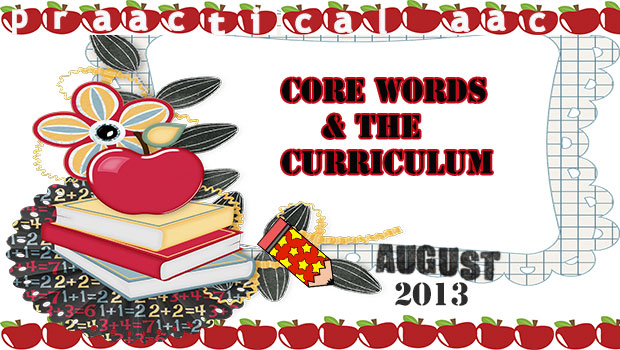
Core words can easily be incorporated into academic curriculum. There just needs to be systematic planning for core word vocabulary and then of course the joining of fringe words. One of the best visual explanations of core words is in the now ‘famous’ you tube video Language Stealers (HD). If you have not seen it, it is worth watching for many reasons but in the context of this post, it perfectly illustrates how you can teach about Greek and Roman history with core words. Planning for Core Words for the Classroom (& ALL School Activities) Have the core word communication board with you at ALL times– If you (SLP/Educator) have your core word communication board, you can model and teach the target core words during all lessons. A premise of this approach is that the student has access to their core word vocabulary display on a no-tech communication board or on their... [Read More...]
August 29, 2013
by Carole Zangari -
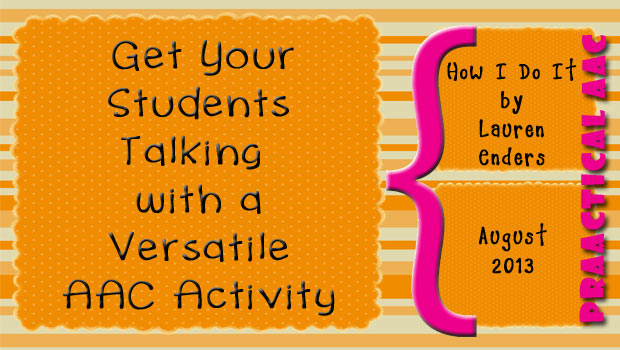
We are so excited to start off the new school year with a wonderfully prAACtical post by Lauren Enders. Lauren’s “How I Do It” posts have been very popular and this one is no different. Today, she shares ways to incorporate key AAC principles in engaging intervention activities and models that with high school students. :::::::::::::::::::::::::::::::::::::::::::::::::::::::::::::::::::::::::::::::::::::::::::::::::::::::::::::::::::::::::::::::::: LEARNING TARGETS (Samples: can be changed to meet student goals) Using core vocabulary, the student will: control the actions of others (beginning with core words like “more”, “stop”, “go”, “again”, and “different”) express his or her opinions through commenting (beginning with core words such as “like”, “don’t like”, “good”, “bad”, and “silly”) TARGET POPULATION: all ages (I have used variations of this activity successfully with students from age 3 through age 21.) TYPE OF AAC: ALL types!! What’s crucial here is the availability of core vocabulary, not the system used. Systems used can vary from... [Read More...]
August 26, 2013
by Robin Parker -
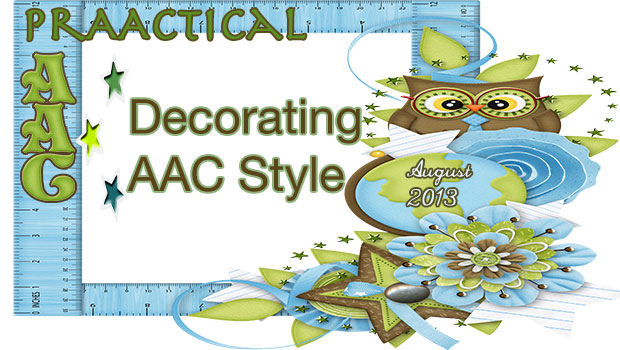
We often write and talk about using every opportunity to teach through meaningful language experiences. This concept works not just for our students and clients but also for professionals and families we collaborate with. Here are some old and new quotes, pictures, and printables to help create meaningful AAC awareness learning opportunities. Just print out the ones you like and you have ‘decorations’ for your office, classroom, speech room, hallways, etc. As we like to say: Use every expected and unexpected opportunity to teach AAC. AAC Myth Busting (AAC ToolBox- Under Miscellaneous) Keep Calm AAC Teaching Posters- Under Miscellaneous ... [Read More...]
August 24, 2013
by Robin Parker -
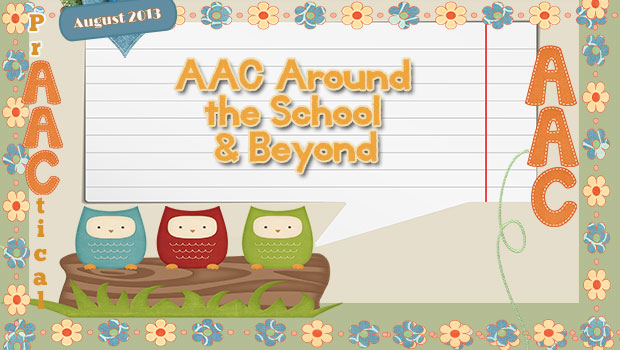
For the August Strategy of the Month, we have been thinking, writing, & talking about AAC in School. School is where AAC learners spend a large portion of their days. There needs to be multiple opportunities for students to USE and LEARN AAC each day. More than that though, we strive for full participation and interaction for students who use AAC. Students should not have to prove that they can do these things before they have ACCESS to AAC strategies and intervention. Here are some things that can be done to help build AAC participation for both students and educators. Provide ACCESS to AAC devices and visual supports throughout ALL activities in ALL places in school and on school sponsored trips/community based instruction. Provide Aided Language Input when teaching AAC to students. Use a Core Word approach when teaching AAC to students but don’t forget about Fringe Vocabulary. Learn and use partner assisted communication... [Read More...]
August 22, 2013
by Carole Zangari -
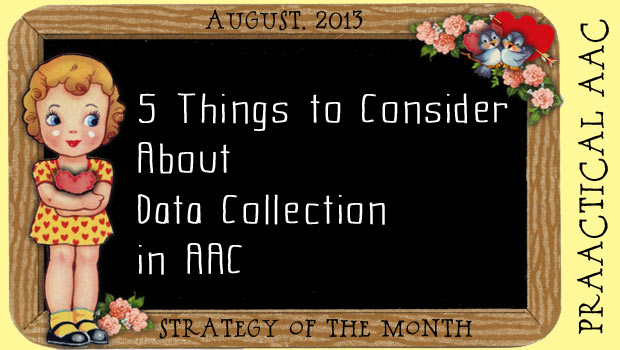
As a rule, SLPs are pretty good about collecting data in their clinical work. Here are some of our prAACtical thoughts about data collection. 1. Don’t bite off more than you can chew. We’ve visited several programs where the client data filled a huge 3-ring binder. In some places, they logged the data daily, reviewed it frequently, and actually USED it to make programmatic decisions. If that works for you, great! But most programs only reviewed the data when they had to report it or prior to a visit by someone who might want to see and discuss those data. In those cases, the data really wasn’t serving it’s original purpose: to see how instruction might need to be tweaked for a client who was learning quickly, slowly, or not at all. The takeaway: Don’t collect more data than you’re prepared to review and put to use. 2. We should... [Read More...]
August 21, 2013
by Robin Parker -
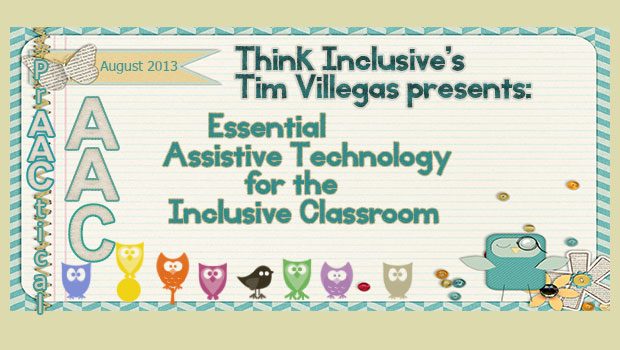
One of our wishes is that all of our students have educators like Think Inclusive’s– Tim Villegas. He has worked in special education and with people with disabilities for the past decade. He has been dedicated to talking and writing and talking about inclusion for everyone (and yes, everyone means everyone). We feel so lucky Tim is our guest blogger today. Read and learn about ‘essentials’ for assistive technology in the inclusive classroom. One of my favorite things to tell people when I discuss what kind of assistive technology (AT) to have for a particular student is to think about their strengths and build from there. In my first year of teaching students with significant cognitive and physical disabilities, one of my students was really good at pushing her foot out to make an affirmative response. So when looking at where to provide a switch or button for her to access…the natural choice... [Read More...]









